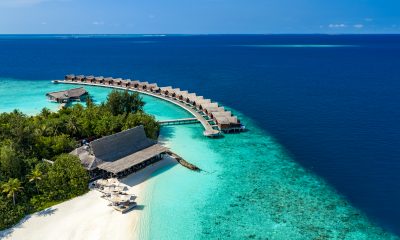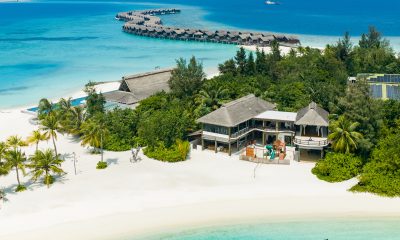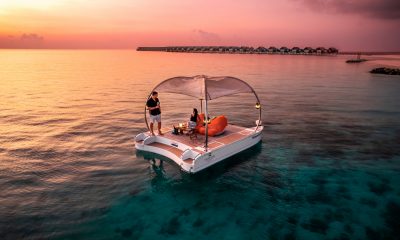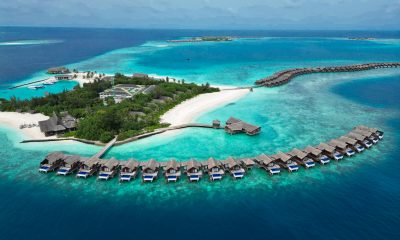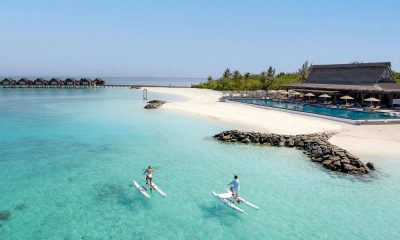Featured
Coral gardening at Grand Park Kodhipparu Maldives

In recent decades, there have been increasing efforts at growing corals in processes variously termed as coral ‘gardening’, ‘farming’, ‘propagation or ‘restoration’. These take advantage of the ability of coral colonies to grow once attached to artificial solid structures.
Since its opening in 2017, Grand Park Kodhipparu, Maldives has established several such coral gardening projects, where coral pieces from the house reef are attached to purposely built underwater structures.
In fact, one of the first sights many guests see when they first arrive on the island is an artificial reef installed below the reception deck.
This tunnel-shaped metal frame had several small pieces of coral attached to it during the first year of hotel operation, with those pieces growing into larger colonies, some of which are already around twenty centimetres in diameter. These colonies are now attracting additional marine life such as juvenile fish.
Whilst this serves to create new marine habitat in the arrival marina area, the resort has also establishes coral ‘nurseries’ in areas of its natural house reef.
The largest of these is a mid-water rope nursery in deeper water, close to the overwater villas. This nursery, built throughout this year, contains 100 pieces of attached corals.
Rope nurseries effectively lift attached coral pieces to grow several feet off the seabed, away from fine sand and organisms that might normally prevent the optimal growth and survival of the coral colonies.
“Many coral nurseries use fragments taken from colonies living on the reef, removed from the ‘donor’ colony and attached in a different area to grow into a new colony (similar to how cuttings are used to propagate plants),” Peter Pringle, the Resident Marine Biologist at Grand Park Kodhipparu, was quoted in a statement, as saying.
“However, as Maldives’ reefs are still recovering from mass coral die-offs experienced in recent marine heat waves, we prefer to leave the surviving colonies on the reef completely intact. We instead use fragments broken off by strong waves, the feeding activities of marine animals or other actions. Collecting such ‘corals of opportunity’ enhances each one’s long-term survival prospects — removing it from where it might be covered by sand and die, to the mid-water rope nursery.”
A different style of nursery, consisting of frames with coral fragments attached to cement pieces, has recently been established, and has allowed guests to actively participate in coral gardening. Coral fragments are attached to cone-shaped cement pieces above water using underwater glue, with participants then able to swim their ‘baby coral’ out from shore to place it in the nursery.
“This activity also has an educational benefit, as participants can better understand how coral colonies live and grow from the physical action of planting a coral, something not always easy to explain using only diagrams and pictures,” Peter said.
Ultimately, after several years of growth in the nursery, these colonies can be shifted to other areas as well, in a process similar to planting trees in landscaping.
Whilst coral gardening is certainly not a replacement for conservation actions needed for the continued survival of coral reefs, such as reducing carbon emissions to lessen climate change effects and improving water quality, it is a constructive approach to increase awareness of reef conservation and coral biology.
Located in North Male Atoll and a 15-minute speedboat ride away from the main Velana International Airport, Grand Park Kodhipparu features a collection of 120 villas, including idyllic beachfront pool villas, breathtaking overwater villas and palatial two-bedroom villas. Sixty-five of the 120 villas come with their own private pools and the five two-bedroom suites feature extensive private terraces.
Designed by world-renowned hospitality design firm Hirsch Bedner Associates, the resort showcases sophisticated architecture, state-of-the-art interior, high ceiling of palm fringed roof, and contemporary exterior with Maldives’ traditional influence of wood and rattan, inventive rustic appeal and inviting peaceful atmosphere. Neutral tones, natural fundamentals and spacious social settings balance the unrivalled beauty of the cobalt sea and tranquility.
Grand Park Kodhipparu offers three restaurants and a pool bar, including the overwater Edge restaurant, which offers a wide selection of international culinary creations, Breeze poolside restaurant and bar, which serves lunch and light bites throughout the day followed by inventive cocktails and fine wines in the night, and the FireDOOR speciality restaurant, which offers grilled meats and fish coupled with the finest wines.
Recreational facilities at the resort include an outdoor swimming pool, gymnasium, sunrise yoga deck, wellness centre with spa and salon treatments, water sports and dive centre, children’s activity centre, and specialty shops.
Cooking
Patina Maldives hosts Chef Shannon Bennett for exclusive April residency

From 1 to 5 April 2026, Patina Maldives, Fari Islands will host Shannon Bennett, one of Australia’s most recognised culinary figures and the creative force behind Belongil. The residency brings together a chef known for shaping dining as an emotional and reflective experience with a destination defined by perspective, creativity and purpose.
Bennett’s career extends beyond traditional notions of cooking. Through projects such as Vue de Monde and Belongil, he has explored dining as a medium for memory, connection and emotion, placing emphasis on experience rather than consumption. His approach centres on creating moments that remain with guests long after the meal has ended.
At Patina Maldives, the residency represents a convergence of shared values. Over five nights, guests are invited to take part in a limited series of dining experiences shaped by intention, curiosity and a sense of place. Rather than recreating Belongil in another setting, the programme evolves its philosophy, drawing inspiration from the natural rhythm and clarity of the Maldivian environment.
Commenting on the collaboration, Bennett said Belongil was conceived as more than a place to eat, but as a space for ideas, connection and lasting moments. He noted that Patina Maldives reflects a similar sense of purpose, adding that bringing his work into the island setting offered an opportunity to create experiences that feel grounded, honest and meaningful.
Patina Maldives continues to develop its identity by providing a platform for global creative voices to shape new conversations and perspectives. The residency with Bennett aligns with this approach, positioning cuisine as one element within a broader cultural and experiential narrative.
Tom Bray, Director of Lifestyle at Patina Maldives, said the resort exists to bring people closer to ideas, creativity and self-discovery. He added that welcoming Bennett reflects this philosophy, describing the residency as an experience designed to shift perspective rather than focus solely on gastronomy.
The residency is presented as an experience defined by intention rather than spectacle. Taking place over five nights on a single island, it brings together Patina Maldives and one of the culinary world’s most reflective minds for a programme shaped by presence, purpose and a sense of moment that cannot be replicated in the same way again.
Featured
You & Me Maldives unveils curated Premium All Inclusive programme
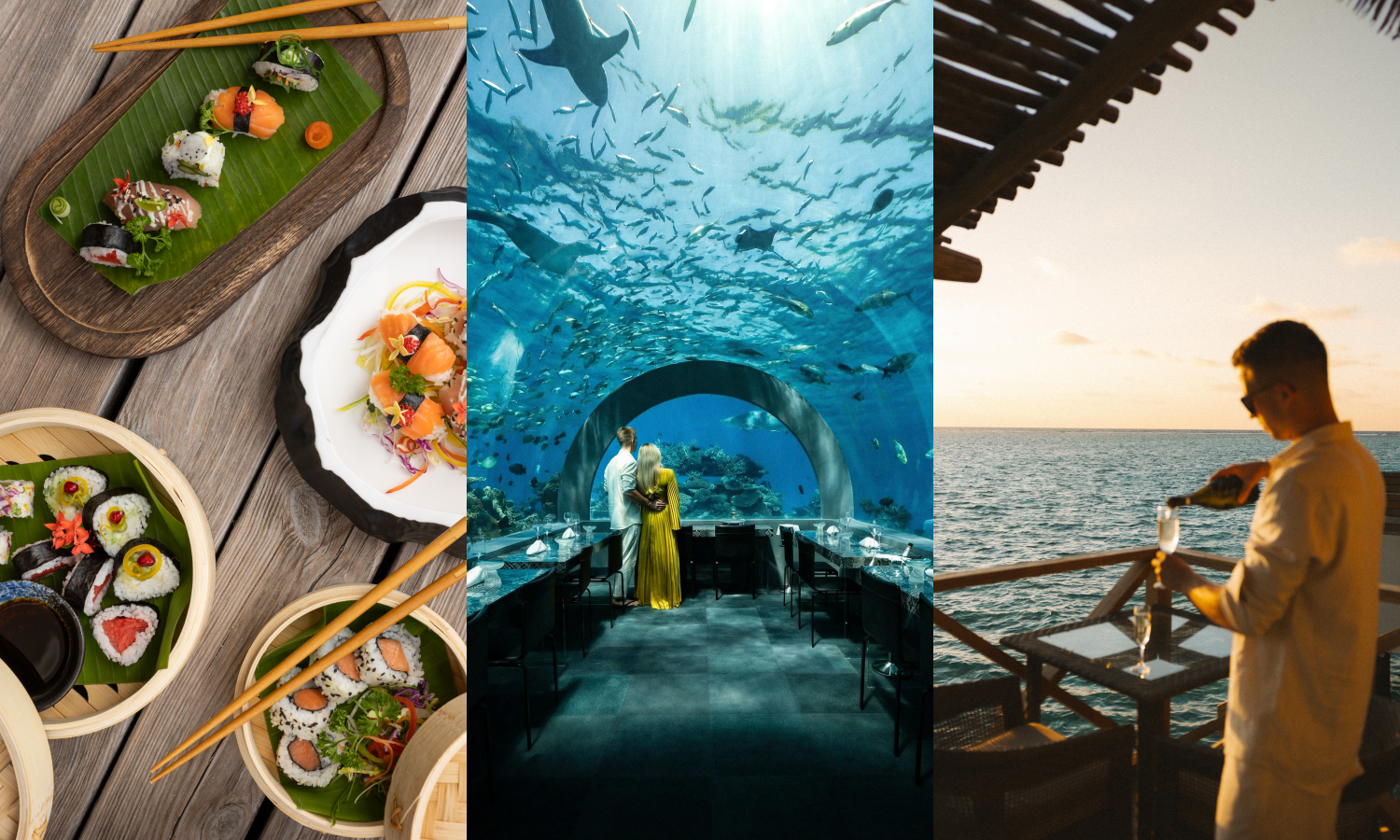
You & Me Maldives, the adults-only luxury retreat under The Cocoon Collection, has announced the launch of its new Premium All Inclusive experience, aimed at enhancing island stays through a more seamless and comprehensive offering in the Indian Ocean.
The Premium All Inclusive experience is designed to begin from the point of arrival. Guests receive complimentary access to The Cocoon Collection Lounge at the seaplane terminal at Velana International Airport, where services are provided to ensure a smooth transition before the journey to the resort.
On arrival at the island, guests are welcomed in their villas with a chilled bottle of sparkling wine and a selection of canapés. The Premium All Inclusive plan includes unlimited premium beverages by the glass, featuring a curated range of wines, signature cocktails, top-shelf spirits, international beers and non-alcoholic options. The in-villa minibar is replenished daily with soft drinks, international beers, red and white wines, as well as assorted snacks. For stays of five nights or more, guests also receive two bottles of premium liquor from a selected list, provided once during the stay.
The experience further includes a range of activities. Guests staying a minimum of three nights are offered one sunset cruise and one snorkelling excursion per stay, while those staying seven nights or more are entitled to a catamaran cruise. Unlimited use of snorkelling equipment and non-motorised water sports, including canoeing, kayaking and paddle boarding, is also included, subject to weather conditions.
Dining forms a central part of the Premium All Inclusive concept. Guests can enjoy three themed dining evenings, including a seafood barbecue under the stars featuring prawns, lobster and oysters. For stays of five nights or more, guests may also take part in a complimentary group cooking class, with a choice between ethnic or Italian cuisine, led by the resort’s culinary team.
Wellness offerings are also incorporated into the programme, with guests able to participate in up to three complimentary sunrise yoga sessions per stay, subject to availability.
The introduction of the Premium All Inclusive experience reflects the resort’s focus on personalised service and carefully curated stays. The offering is positioned to appeal to couples seeking relaxation, romance or activity-led experiences within an adults-only island setting.
Featured
Eid celebrations at SO/ Maldives blend Arabic tradition and Maldivian culture

SO/ Maldives is inviting global travellers this season to reimagine Eid not merely as a holiday, but as an immersive island escape. Located just 15 minutes by speedboat from Malé, the fashion-forward private island retreat sets the stage for a celebration where cultural heritage, contemporary luxury and tropical glamour come together.
At the centre of the festivities is an authentic culinary experience at Hadaba, the resort’s award-winning Arabic restaurant. Guests are offered Levantine flavours, artisanal mezze and traditional recipes presented with a modern approach, creating a setting for shared dining and celebration. As part of the resort’s dine-around concept, Hadaba can be included in a wider culinary journey across the island, allowing guests to experience Arabic cuisine alongside the resort’s other dining venues.
As evening falls, celebrations move to Lazuli Beach Club, where shisha rituals and Arabic-inspired refreshments are served in a beachfront setting. Traditional performances are complemented by Maldivian Boduberu drumming and fire dance displays, creating a cultural programme designed to appeal to international travellers seeking meaningful experiences.
Across the island, Eid is marked through a series of curated activities aimed at encouraging connection and creativity. Cultural workshops, including palm-leaf artistry and henna sessions, offer opportunities to explore heritage, while younger guests are engaged through themed crafts, interactive games and sweet treat decorating. The overall atmosphere remains celebratory while maintaining a relaxed pace that reflects the resort’s character.
Beyond the festive programme, the resort positions the long weekend as a fully immersive island retreat. Guests stay in beach and overwater villas featuring private pools and ocean views, with interiors inspired by high fashion. Time is spent between spa treatments, lagoon activities, beach club experiences and sunset dining, balancing celebration with seclusion.
To mark the season, the resort has introduced two limited-time stay offers. The One Night on Us offer provides savings of 33 per cent on stays of three nights or more, along with daily breakfast, complimentary transfers and spa privileges. The Soo Summer package offers preferential rates combined with spa experiences, curated dining inclusions and additional benefits for water villa stays.
Welcoming travellers from Europe, Asia, the Middle East and beyond, the resort presents Eid as a global celebration where Arabic traditions, Maldivian culture and contemporary design are brought together. This season, guests are invited to exchange routine for island surroundings and experience Eid through a redefined island perspective.
-
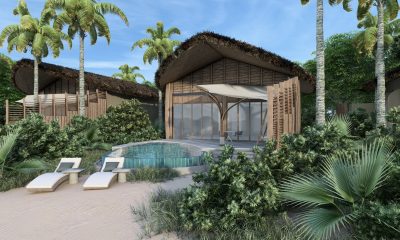
 News1 week ago
News1 week agoPulse Hotels & Resorts unveils Aura Maldives, a mindful luxury sanctuary
-
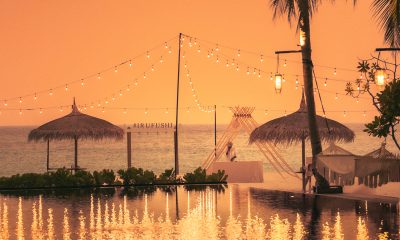
 News1 week ago
News1 week agoSun Siyam Iru Fushi sets new nenchmark with 24 Hour Premium All Inclusive Dine Around
-
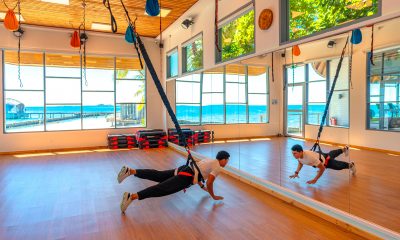
 Fitness1 week ago
Fitness1 week agoOUTRIGGER Maldives Maafushivaru launches expanded wellness programming for 2026
-
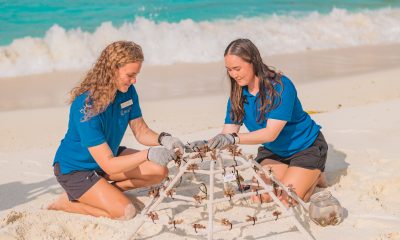
 Action1 week ago
Action1 week agoSheraton Maldives Full Moon celebrates sixth anniversary of Reefscapers collaboration
-
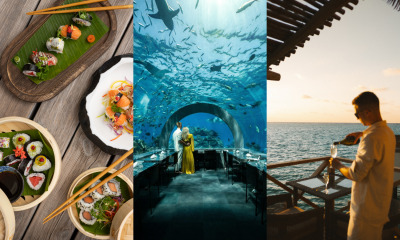
 Featured1 week ago
Featured1 week agoYou & Me Maldives unveils curated Premium All Inclusive programme
-
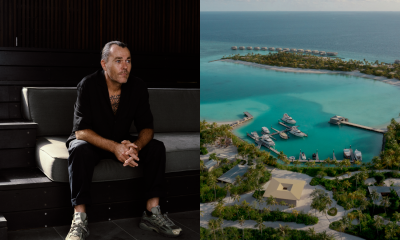
 Cooking1 week ago
Cooking1 week agoPatina Maldives hosts Chef Shannon Bennett for exclusive April residency
-
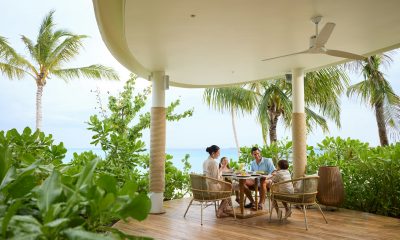
 Awards1 week ago
Awards1 week agoCentara Mirage Lagoon Maldives named Luxury Family Friendly Resort of the Year
-
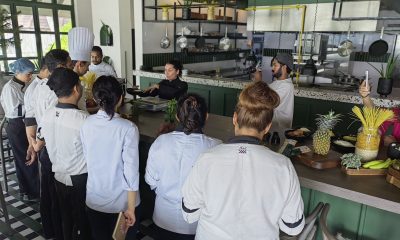
 Cooking1 week ago
Cooking1 week agoSun Siyam Olhuveli hosts Italian Chef Francesca Gambacorta at Milano restaurant



